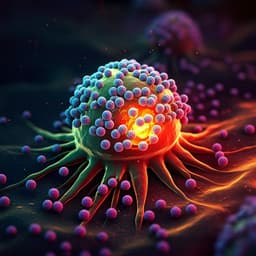
Medicine and Health
Microbiome-derived antimicrobial peptides offer therapeutic solutions for the treatment of *Pseudomonas aeruginosa* infections
A. J. Mulkern, L. B. Oyama, et al.
Discover groundbreaking research by Adam J. Mulkern and colleagues on the exceptional antimicrobial properties of rumen microbiome-derived peptides against *Pseudomonas aeruginosa*. This study reveals that these peptides not only exhibit significant antimicrobial activity but also prevent resistance development and show efficacy in vivo, highlighting a promising avenue for therapeutic applications.
Related Publications
Explore these studies to deepen your understanding of the subject.







